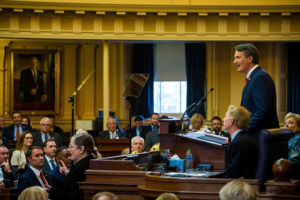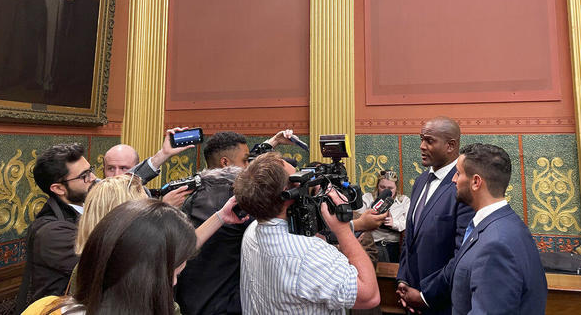Four states to elect legislators
Only a few states elect new legislatures in odd-numbered years, but this year’s elections feature some particularly interesting twists.

Gov. Glenn Youngkin addressing the Virginia legislature.
If this Republican trend holds and the GOP flips at least three seats in the Virginia Senate, it will win full control of the state under Republican Gov. Glenn Youngkin. Besides giving Republicans free rein to enact their agenda on controversial topics such as abortion, reports from Richmond say a GOP victory would likely propel Youngkin to throw his hat into the 2024 presidential race.
Adding to the suspense, though, is the fact that Virginia’s race will be held with new legislative districts. The COVID-19 pandemic delayed the release of 2020 census data, causing the 2021 elections to be held using decade-old maps.
In Louisiana, the GOP has already won such a “trifecta,” due to an unusual process in which all candidates, regardless of party, compete in the same primary. Any candidate who wins a majority in the primary is declared the winner, and no general election takes place. Incumbent Democratic Gov. John Bel Edwards was term-limited in 2023, and Republican Attorney General Jeff Landry “won” the Oct. 14 primary. Other such “wins” in the primary guarantee that Republicans will control both the House and Senate as well, after the general election runoffs on Nov. 18.
In New Jersey, like Virginia, legislative elections are being held for the first time with new maps. Here, however, voters are expected to again leave Democrats in full control in Trenton. Republicans, meanwhile, are assured to retain control of both house of the Mississippi legislature, because Democrats did not run candidates in enough seats to flip either chamber.
Finally, a special election in New Hampshire could leave the two major parties tied, at least temporarily, for control of the 400-member House. Republicans currently hold a one-vote 198-197 edge, with two independents and three vacancies. Only one of the three vacant seats will be filled on Nov. 7; special elections for the other two House seats will be held in January.


